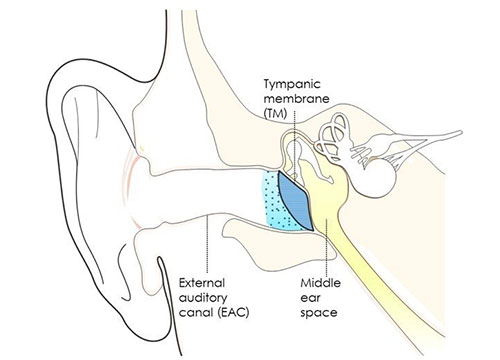Middle-ear infections or acute otitis media. The study included children ages 6 to 35 months who had had at least three episodes of middle ear infections acute otitis media within a 6-month period.
 One Dose Cure For Ear Infections
One Dose Cure For Ear Infections
Drugs used to treat Otitis Media.
:max_bytes(150000):strip_icc()/overview-of-ear-infections-770631-5c5dbc4c46e0fb00015874c4.png)
Middle ear infection antibiotics. The middle ear ME mucosa is a thin monolayer epithelium considered as a lion-specialized site where antibiotics penetrate by passive diffusion through the capillary meinbrane in interstitial fluid. It can also help you hear better. Sometimes fluid stays in the middle ear even after you take antibiotics and the infection goes away.
Most outer and middle ear infections do not need antibiotics. Aminoglycosides have been the main treatment for bacterial ear infections for decades. It is not often done in adults.
Select drug class All drug classes quinolones 2 sulfonamides 7 urinary anti-infectives 2 first generation cephalosporins 2 second generation cephalosporins 6 third generation cephalosporins 8 otic. Pain medications Acetaminophen Tylenol Ibuprofen Advil Motrin Pseudoephedrine Sudafed to ease ear pressure Antibiotic ear drops for infections of the ear canal otitis externa Neomycin Ak-Spore HC Cortisporin Neotricin HC. Some middle ear infections lead to the condition known as glue ear when thick fluid in the middle ear causes slight deafness.
This can include antibiotics and surgery to insert pressure-equalising tubes in the ear drums. The tube is put at the opening of the eardrum. In adults most otitis media cases are not bacterial but rather are from fluid collections behind the ear drum.
Antibiotics or sterile ear drops are the suggested. In the healthy ME mucosa lipid-soluble molecules reach lower. An ear infection does not start to get better after 3 days you or your child has any fluid coming out of their ear.
Now and again the infection may likewise include the external ear. Antibiotics to prevent acute ear infections in. Middle and inner ear infections may cause fever and balance problems.
The study involved 250 children ranging in age from 6 months to nearly 3 years who had had at least three middle-ear infections in the previous six months or four in the same year. Are Antibiotics Effective in Adults with Middle Ear Infections Whether antibiotics work is dependent upon the cause of infection. Medications used to treat ear infections include.
Antibiotics are effective only for bacterial infections and useless against viruses. Pain relievers for children with acute middle ear infection. Otitis externa caused due to swimmers ear.
The children were followed for two years. Most quinolone antibiotics in. Children with glue ear usually recover in a few weeks after the fluid has drained away.
The tube keeps fluid from building up and relieves pressure in the middle ear. Many cases are caused by viruses which antibiotics arent effective against. Overall there were no differences between children in the two groups when it came to the rate or severity of ear infections.
Inner ear infections should be treated by a doctor specializing in ear and hearing problems. The following list of medications are in some way related to or used in the treatment of this condition. Systemic corticosteroids for improving symptoms in children with acute middle ear infection.
Children who had had at least four. Unlike antibiotics she explained ear tubes can offer instant relief from hearing damage caused by middle-ear fluid the benefit of which may be difficult to measure in the current sample. This surgery is called myringotomy.
Antibiotics arent routinely used to treat middle ear infections as theres no evidence that they speed up the healing process. Using antibiotics to treat minor bacterial infections also increases the likelihood of bacteria becoming resistant to them over time. Pneumococcal vaccination for preventing acute middle ear infections in children.
Otitis externa is the medical term for a disease infect the ear canal prompting the eardrum. Quinolones are the most recently introduced ototopical antibiotics. They were randomly assigned to receive medical management which involved receiving oral antibiotics at the time of ear infections or the surgical insertion of tubes and antibiotic ear drops.
In this case your health care provider may suggest that a small tube be placed in your ear. Antibiotics decongestants or nasal steroids do not hasten the clearance of. Over the two-year study though there was no clear advantage of ear tubes when it came to new infections or antibiotic.
And though the children in. Antibiotics might be prescribed if. Antibiotics are not usually offered because infections inside the ear often clear up on their own and antibiotics make little difference to symptoms including pain.
If your doctor recommends antibiotics to treat a severe ear infection they will likely recommend an oral treatment such as amoxicillin Amoxil. Which antibiotic is best for an ear infection. Inner ear infections also may cause nausea vomiting vertigo ringing in the ear and labyrinthitis inflammation of the inner ear.
Otitis media with effusion is defined as middle ear effusion in the absence of acute symptoms. This is not permanent but it may need treatment.
